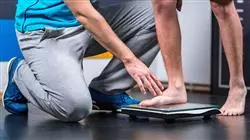University certificate
Scientific endorser

The world's largest faculty of sports science”
Introduction to the Program
Food and sport must go hand in hand, as it is essential for the athlete to acquire a proper diet that will help him/her improve his/her performance"

Immerse yourself in the study of this Professional master’s degree and improve your skills in nutritional counseling for athletes"
This Professional master’s degree focuses on the less studied aspects during the university career, making it possible to expand the knowledge necessary to cover a wide spectrum of potential athletes, as well as to meet their nutritional needs. Within this Professional master’s degree we find a teaching staff of the highest level, made up of professionals closely related to sports nutrition, outstanding in their field and leading lines of research and field work, as well as recognized specialists from leading societies and prestigious universities. The teachers of this Professional master’s degree are professionals who seek excellence in their teaching and work, teaching in university centers and working with athletes to maximize their performance.
The Professional master’s degree has multimedia content that helps to acquire the knowledge taught, developed with the latest educational technology. At the same time, it will provide the student with situated and contextual learning, within a simulated environment that provides training focused on solving real problems.
Thanks to its online training, you can organize your time and pace of learning, adapting it to your schedules in addition to being able to access the contents from any computer or mobile device. You will have the opportunity to follow a program that brings together the most advanced and in-depth knowledge, where a group of highly regarded professors with extensive international experience provides you with the most complete and up-to-date information.
Learn the most suitable diets for each type of athlete and you will be able to give more personalized advice"
This Professional master’s degree in Sports Nutrition in Special Populations contains the most complete and up-to-date scientific program on the market. The most important features of the program include:
- The graphic, schematic, and eminently practical contents with which they are created contain information that is indispensable for professional
- It contains exercises where the self-assessment process can be carried out to improve learning
- Algorithm-based interactive learning system for decision-making for patients with feeding problems
- Theoretical lessons, questions to the expert, debate forums on controversial topics, and individual reflection work
- Content that is accessible from any fixed or portable device with an Internet connection
This Professional master’s degree may be the best investment you can make when choosing a refresher program for two reasons: in addition to expanding your knowledge in Sports Nutrition in Special Populations, you will obtain a Master's Degree from TECH Global University
The teaching staff includes professionals from the field of sports science, who bring their experience to this training program, as well as renowned specialists from leading societies and prestigious universities.
The multimedia content, developed with the latest educational technology, will provide the professional with situated and contextual learning, i.e., a simulated environment that will provide immersive training programmed to train in real situations.
This program is designed around Problem Based Learning, whereby the professional must try to solve the different professional practice situations that arise during the Master’s Degree. For this purpose, the professional will be assisted by an innovative interactive video system created by renowned and experienced experts in sports nutrition with extensive experience.
The Professional master’s degree program offers training in simulated environments, which provides an immersive learning experience designed to train for real-life situations"

This 100% online Professional master’s degree will allow you to combine your studies with your professional work while increasing your knowledge in this field"
Why study at TECH?
TECH is the world’s largest online university. With an impressive catalog of more than 14,000 university programs available in 11 languages, it is positioned as a leader in employability, with a 99% job placement rate. In addition, it relies on an enormous faculty of more than 6,000 professors of the highest international renown.

Study at the world's largest online university and guarantee your professional success. The future starts at TECH”
The world’s best online university according to FORBES
The prestigious Forbes magazine, specialized in business and finance, has highlighted TECH as “the world's best online university” This is what they have recently stated in an article in their digital edition in which they echo the success story of this institution, “thanks to the academic offer it provides, the selection of its teaching staff, and an innovative learning method aimed at educating the professionals of the future”
A revolutionary study method, a cutting-edge faculty and a practical focus: the key to TECH's success.
The most complete study plans on the university scene
TECH offers the most complete study plans on the university scene, with syllabuses that cover fundamental concepts and, at the same time, the main scientific advances in their specific scientific areas. In addition, these programs are continuously being updated to guarantee students the academic vanguard and the most in-demand professional skills. In this way, the university's qualifications provide its graduates with a significant advantage to propel their careers to success.
TECH offers the most comprehensive and intensive study plans on the current university scene.
A world-class teaching staff
TECH's teaching staff is made up of more than 6,000 professors with the highest international recognition. Professors, researchers and top executives of multinational companies, including Isaiah Covington, performance coach of the Boston Celtics; Magda Romanska, principal investigator at Harvard MetaLAB; Ignacio Wistumba, chairman of the department of translational molecular pathology at MD Anderson Cancer Center; and D.W. Pine, creative director of TIME magazine, among others.
Internationally renowned experts, specialized in different branches of Health, Technology, Communication and Business, form part of the TECH faculty.
A unique learning method
TECH is the first university to use Relearning in all its programs. It is the best online learning methodology, accredited with international teaching quality certifications, provided by prestigious educational agencies. In addition, this disruptive educational model is complemented with the “Case Method”, thereby setting up a unique online teaching strategy. Innovative teaching resources are also implemented, including detailed videos, infographics and interactive summaries.
TECH combines Relearning and the Case Method in all its university programs to guarantee excellent theoretical and practical learning, studying whenever and wherever you want.
The world's largest online university
TECH is the world’s largest online university. We are the largest educational institution, with the best and widest online educational catalog, one hundred percent online and covering the vast majority of areas of knowledge. We offer a large selection of our own degrees and accredited online undergraduate and postgraduate degrees. In total, more than 14,000 university degrees, in eleven different languages, make us the largest educational largest in the world.
TECH has the world's most extensive catalog of academic and official programs, available in more than 11 languages.
Google Premier Partner
The American technology giant has awarded TECH the Google Google Premier Partner badge. This award, which is only available to 3% of the world's companies, highlights the efficient, flexible and tailored experience that this university provides to students. The recognition as a Google Premier Partner not only accredits the maximum rigor, performance and investment in TECH's digital infrastructures, but also places this university as one of the world's leading technology companies.
Google has positioned TECH in the top 3% of the world's most important technology companies by awarding it its Google Premier Partner badge.
The official online university of the NBA
TECH is the official online university of the NBA. Thanks to our agreement with the biggest league in basketball, we offer our students exclusive university programs, as well as a wide variety of educational resources focused on the business of the league and other areas of the sports industry. Each program is made up of a uniquely designed syllabus and features exceptional guest hosts: professionals with a distinguished sports background who will offer their expertise on the most relevant topics.
TECH has been selected by the NBA, the world's top basketball league, as its official online university.
The top-rated university by its students
Students have positioned TECH as the world's top-rated university on the main review websites, with a highest rating of 4.9 out of 5, obtained from more than 1,000 reviews. These results consolidate TECH as the benchmark university institution at an international level, reflecting the excellence and positive impact of its educational model.” reflecting the excellence and positive impact of its educational model.”
TECH is the world’s top-rated university by its students.
Leaders in employability
TECH has managed to become the leading university in employability. 99% of its students obtain jobs in the academic field they have studied, within one year of completing any of the university's programs. A similar number achieve immediate career enhancement. All this thanks to a study methodology that bases its effectiveness on the acquisition of practical skills, which are absolutely necessary for professional development.
99% of TECH graduates find a job within a year of completing their studies.
Professional Master's Degree in Sports Nutrition in Special Populations
. ?
The Professional Master's Degree in Sports Nutrition in Special Populations offers the student all the necessary tools to be able to consolidate plans and programs to improve body performance based on nutritional intake. Here, knowledge from different disciplines will be grouped in order to favor the understanding of the conditions in patients, being present the variants of time, intensity and endurance of the athlete, among others. It is a course that will help to train students comprehensively from the latest studies and reports in the construction of basic and advanced skills related to nutrition in physical activity in communities with particular characteristics, so that graduates stand out in the health sector. In the web classroom you will be able to find didactic and audiovisual elements that will allow a greater approach to the subject matter, such as master classes, questions to the faculty, discussion forums and individual reflection activities.
Study this Professional Master's Degree Sports Nutrition online
?
This program is developed over one year and consists of ten modules, which delves into muscle and metabolic physiology related to exercise, the assessment of the athlete at different times of the season, water sports, adverse conditions, vegetarianism and veganism, type 1 diabetic athlete, paradeportistas, sports by weight category, different stages or specific populations and the passage through the injury period. All of the above was designed with the objectives of handling advanced knowledge on nutritional planning, as well as knowing how to work in multidisciplinary environments, incorporating the various scientific researches of the working field. In the Professional Master's Degree, several simulated clinical cases will be approached, for which a literature research must be carried out, as well as establishing some kind of hypothesis to the problem posed, so that finally the picture presented by the patient(s) is solved. The above will be complemented with the methodology that results in long-term learning and where readings and additional research to the initial material, interactive summaries and the testing and retesting model are present.







